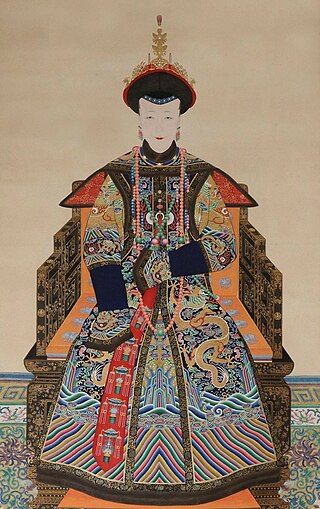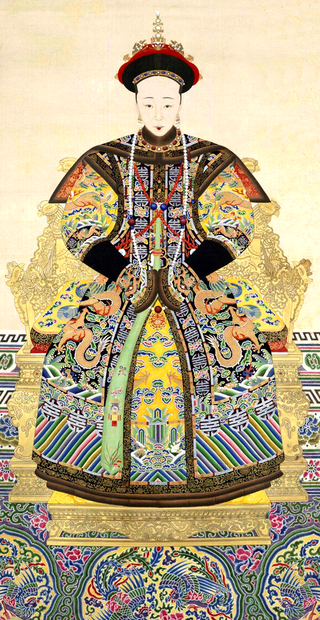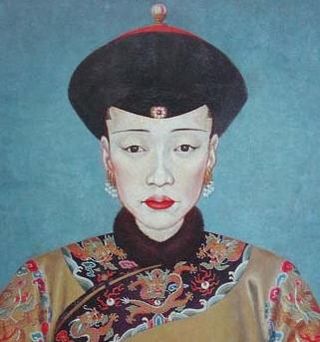
The Daoguang Emperor, also known by his temple name Emperor Xuanzong of Qing, personal name Mianning, was the seventh emperor of the Qing dynasty, and the sixth Qing emperor to rule over China proper, reigning from 1820 to 1850. His reign was marked by "external disaster and internal rebellion." These included the First Opium War and the beginning of the Taiping Rebellion which nearly brought down the dynasty. The historian Jonathan Spence characterizes the Daoguang Emperor as a "well meaning but ineffective man" who promoted officials who "presented a purist view even if they had nothing to say about the domestic and foreign problems surrounding the dynasty."

Empress Xiaoquancheng, of the Manchu Bordered Yellow Banner Niohuru clan, was a posthumous name bestowed to the wife and second empress consort of Mianning, the Daoguang Emperor. She was empress consort of Qing from 1834 until her death in 1840.
Imperial Noble Consort Zhuangjing, of the Manchu Plain Red Banner Tatara clan, was a consort of the Xianfeng Emperor. She was six years his junior.

Imperial Noble Consort Gongshun (恭順皇貴妃) of the Manchu Bordered Yellow Banner Niohuru clan (鈕祜祿氏) was a consort of the Jiaqing Emperor. She was 27 years his junior.

Empress Xiaoherui, of the Manchu Bordered Yellow Banner Niohuru clan, was a posthumous name bestowed to the wife and second empress consort of Yongyan, the Jiaqing Emperor. She was empress consort of Qing from 1801 until her husband's death in 1820, after which she was honoured as Empress Dowager Gongci during the reign of her step-son, Mianning, the Daoguang Emperor. She was the longest-serving empress consort in Qing history.

Empress Xiaoshurui (孝淑睿皇后), of the Manchu Plain White Banner Hitara clan (喜塔臘氏) was a posthumous name bestowed to the wife and first empress consort of Yongyan, the Jiaqing Emperor. She was empress consort of Qing from 1796 until her death in 1797, having been empress for barely a year.

Empress Xiaojingcheng, of the Manchu Plain Yellow Banner Borjigit clan, was a posthumous name bestowed to a consort of Mianning, the Daoguang Emperor. She was honoured as Empress Dowager Kangci during the reign of her step-son, Yizhu, the Xianfeng Emperor. She was the only Qing empress dowager who was neither her husband's empress consort nor emperor's mother.

Empress Xiaoyichun, of the Manchu Bordered Yellow Banner Weigiya clan, was a consort of the Qianlong Emperor. She was 16 years younger than him. Her eldest surviving son became the Jiaqing Emperor.
Imperial Noble Consort Zhuangshun, of the Manchu Uya clan, was a consort of the Daoguang Emperor. She was 40 years his junior. She was the paternal grandmother of the Guangxu Emperor and the great grandmother of The Qing Dynasty's last emperor, Puyi through her son, Yixuan.

Empress Xiaomucheng, of the Manchu Bordered Yellow Banner Niohuru clan, was a consort of the Daoguang Emperor.

Empress Xiaoshencheng, of the Manchu Bordered Yellow Banner Tunggiya clan, was a posthumous name bestowed to the wife and first empress consort of Mianning, the Daoguang Emperor. She was empress consort of Qing from 1822 until her death in 1833.

Consort Xiang, of the Manchu Niohuru clan, was a consort of the Daoguang Emperor. She was 26 years his junior and of the same age as his eldest son Prince Yiwei.

Imperial Noble Consort Qinggong, of the Han Chinese Bordered Yellow Banner Lu clan, was a consort of the Qianlong Emperor. She was 13 years his junior. She came from the Lu clan. Although her family was not a very prominent one, Lady Lu rose to Noble Consort in her lifetime. Imperial Noble Consort Qinggong had no children of her own, but raised Prince Yongyan, the future Jiaqing Emperor.

Noble Consort Ying, of the Mongol Bordered Red Banner Barin clan, was a consort of the Qianlong Emperor. She was 20 years his junior.

Consort Dun, of the Manchu Plain White Banner Wang clan, was a consort of the Qianlong Emperor. She was 35 years his junior.

Noble Consort Xun, of the Manchu Bordered Blue Banner Irgen Gioro clan, was a consort of the Qianlong Emperor. She was 47 years his junior.

Noble Consort Wan, of the Han Chinese Chen clan, was a consort of the Qianlong Emperor. She was five years his junior.

Noble Consort Tong, of the Manchu Šumuru clan, was a consort of the Daoguang Emperor. She was 35 years his junior.
Consort Chang, of the Manchu Hešeri clan belonging to the Bordered Blue Banner, was a consort of the Daoguang Emperor.
Aisin Gioro Yiwei was Qing dynasty imperial prince as Daoguang Emperor's first son. As the emperor's eldest son, he was an heir presumptive until his death. Though he was not granted a title of a crown prince, he was made the first Prince Yinzhi of the Second Rank. As the peerage was not granted iron-cap status, each subsequent successor would hold diminished ranks no lower than feng'en fuguo gong.
















